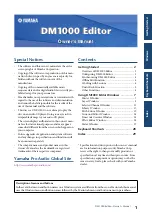
AT-S63 Management Software Features Guide
Section IX: Management Security
459
Guidelines
Below are guidelines for the management ACL:
The default setting for this feature is disabled.
A switch can have only one management ACL.
A management ACL can have up to 256 ACEs.
An ACE must have an IP address and mask.
All management ACEs are implicit “permit” statements. A management
packet that meets the criteria of an ACE is accepted by the switch.
Consequently, the ACEs you enter into the management ACL should
specify which management packets you want the switch to process.
Management packets that do not meet any of the ACEs in the
management ACL are discarded.
A management packet that meets an ACE is immediately processed
by the switch and is not compared against any remaining ACEs in the
management ACL.
The ACEs are performed in the order of their identification number,
starting with 1.
The management ACL does not control local management or remote
SSH or SNMP management of a switch.
Activating this feature without specifying any ACEs prohibits you from
managing the switch remotely using a Telnet application or web
browser because the switch discards all Telnet and web browser
management packets.
You can apply management ACLs to both master and slave switches
in an enhanced stack. A management ACL on a master switch filters
management packets intended for the master switch as well as those
intended for any slave switches that you manage through the master
switch. A management ACL applied to a slave switch filters only those
management packets directed to the slave switch.
Summary of Contents for AT-S63
Page 14: ...Figures 14 ...
Page 18: ...Tables 18 ...
Page 28: ...28 Section I Basic Operations ...
Page 58: ...Chapter 1 Overview 58 ...
Page 76: ...Chapter 2 AT 9400Ts Stacks 76 Section I Basic Operations ...
Page 96: ...Chapter 5 MAC Address Table 96 Section I Basic Operations ...
Page 114: ...Chapter 8 Port Mirror 114 Section I Basic Operations ...
Page 116: ...116 Section II Advanced Operations ...
Page 146: ...Chapter 12 Access Control Lists 146 Section II Advanced Operations ...
Page 176: ...Chapter 14 Quality of Service 176 Section II Advanced Operations ...
Page 196: ...196 Section III Snooping Protocols ...
Page 204: ...Chapter 18 Multicast Listener Discovery Snooping 204 Section III Snooping Protocols ...
Page 216: ...Chapter 20 Ethernet Protection Switching Ring Snooping 216 Section III Snooping Protocols ...
Page 218: ...218 Section IV SNMPv3 ...
Page 234: ...234 Section V Spanning Tree Protocols ...
Page 268: ...268 Section VI Virtual LANs ...
Page 306: ...Chapter 27 Protected Ports VLANs 306 Section VI Virtual LANs ...
Page 320: ...320 Section VII Internet Protocol Routing ...
Page 360: ...Chapter 30 BOOTP Relay Agent 360 Section VII Routing ...
Page 370: ...Chapter 31 Virtual Router Redundancy Protocol 370 Section VII Routing ...
Page 372: ...372 Section VIII Port Security ...
Page 402: ...Chapter 33 802 1x Port based Network Access Control 402 Section VIII Port Security ...
Page 404: ...404 Section IX Management Security ...
Page 436: ...Chapter 36 PKI Certificates and SSL 436 Section IX Management Security ...
Page 454: ...Chapter 38 TACACS and RADIUS Protocols 454 Section IX Management Security ...
Page 462: ...Chapter 39 Management Access Control List 462 Section IX Management Security ...
Page 532: ...Appendix D MIB Objects 532 ...
















































